The food industry transformation discussed during platform day
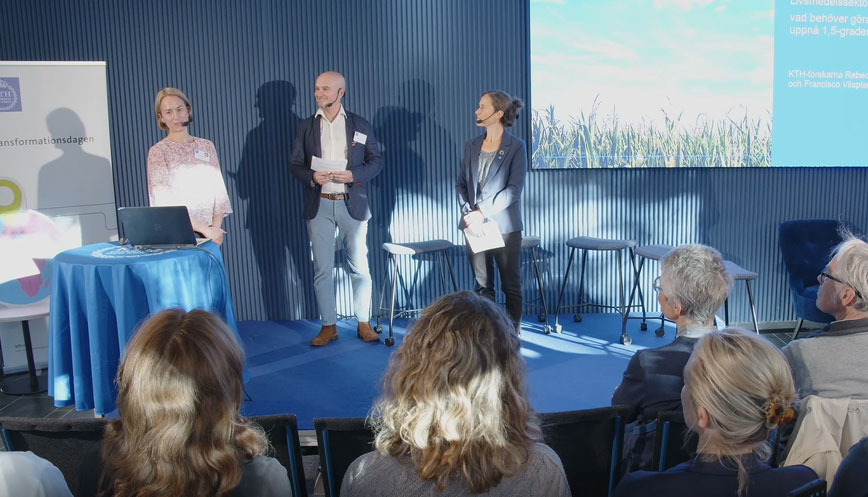
11 October 2022 was KTH’s Transformation Day, this year on the theme of transformation in the food industry. The aim was to highlight how the food industry is being transformed for climate and competitiveness and how this transformation is supported by research at KTH. More than 140 participants joined the transformation day together with invited parties from the food sector to discuss their activities and needs, and provided examples of sustainable food production and sustainable business models.
Monica Bellgran, Kerstin Forsberg and Martin Grimheden, who head up KTH’s Industrial Transformation Platform , a research platform, began by welcoming guests and students to the event and presenting the agenda. They then handed over to Donnie Sc Lygonis, who said that anyone with an idea for improved food production who has even the slightest link to KTH – now or in the past – is welcome to contact him or one of the other business development coaches at KTH Innovation .
The food sector – what needs to be done to achieve the 1.5°C goal?
KTH researchers Rebecka Milestad and Francisco Vilaplana talked about their research background, why the food sector plays such an important part in achieving the Paris Agreement’s goal of limiting the global temperature increase to 1.5°C, and what contribution research can make.
“The food sector is contributing to the global sustainability and health problems we face today, but it’s also a factor in how we can find solutions. It’s hard to find a single one of the global goals that’s not connected to the food system and there are a great deal of goal conflicts, which is one reason why a systems approach to these issues is needed,” Rebecka Milestad explained.
Francisco Vilaplana talked about how research can play a part in different chains involved in the food system, and provided a reminder that sustainability and health go together, for instance in issues related to nutrition. Food issues entail some complex links and associations, and this is something he appreciates as a KTH researcher.
“One research project under way at KTH relates to optimising production methods, such as vertical farming, which requires fewer resources. We’re also looking at how we can source food from completely different places, using different organisms to the ones we use today. Food waste, which is responsible for ten per cent of the sector’s emissions, is another important aspect in the research. At KTH we also have projects looking at how we can use fibres from wheat bran, which are currently a waste product,” said Francisco Vilaplana.
Session 1: Transformations happening in the food industry, part one
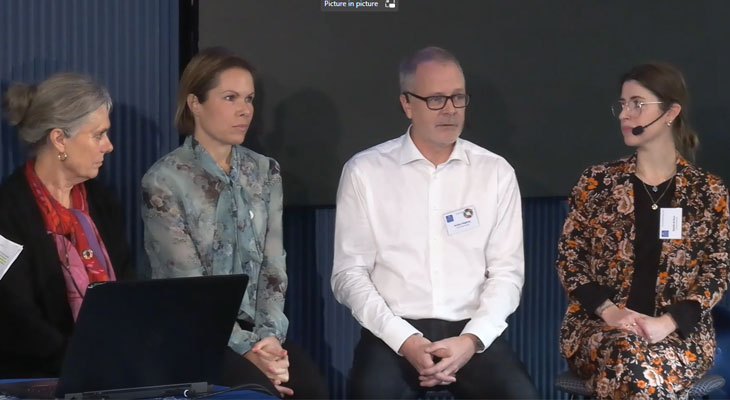
Next, it was time for the first guests to take to the stage. They began by talking about their own work in their organisations to achieve increased sustainability.
Anders Högberg, Research & Strategic Partnership Manager at Orkla Foods Sverige , said that the company will be climate neutral by 2045 and will halve its footprint by 2030. He said that right now, we are “eating our planet to death”. The key is to reduce waste, but also the content of the products and production itself.
Helena Nordlund, Programme Coordinator and Senior Advisor for Södertälje Municipality & MatLust Development Node , talked about her environment for meetings between the public, private and academic sectors. They are running a wide range of projects with a regional and also national focus, and have been emphasising high environmental and health demands from a systems approach for the past 20 years.
Natalie de Brun, Co-Founder & CFO of Grönska Stadsodling , talked about sustainable food production to protect nature and the environment. (Speaker gifts and guest goodie-bags were fresh herbs from Grönska.) The company was founded in 2014 in Hammarbyhöjden, Stockholm, and focuses on vertical farming, bringing food production indoors rather than taking up agricultural land.
Victoria Olsson, Senior Sustainability Manager at Arla Foods Sweden , talked about how their cooperative of 9,000 dairy farmers in seven countries aims to eliminate carbon dioxide emissions by 2050 internationally, and by as soon as 2045 in Sweden. They use the Science Based Targets method, which calls for concrete plans, and described the operation’s planned journey; it largely comes down to management, measurement, and compensation for the individual dairy farm.
The panel then discussed what research is needed to contribute to transformation in the food industry.
“Carbon sequestration is an important area of research. Also, ensuring that nutrition aspects are included more in research into food production,” said Victoria Olsson.
Natalie de Brun said that research into quantifiable data for emissions, life cycle analyses, and fact-based decisions relating to choice of materials are some of the types of developments that small companies cannot afford to develop by themselves, and where the academic sector can be of great help.
“We need more behavioural research into food habits, why we as consumers accept one kind of food but not another. Also more business-focused research, how we can make sustainable food production profitable,” Helena Nordlund explained.
Anders Högberg requested research in all areas of the food system. He added that money is available for food research now, and that everyone in the sector wants to work together towards a solution. He said the most important thing is implementation, obtaining help to deliver the knowledge out into the system.
When asked what was most important to begin the transformation in their companies, several of the guests replied that their organisations have long been working towards a sustainable transition, but that interest has exploded in recent years. An increased consumer focus on sustainable food, as well as the recurring climate and geopolitical crises, has also accelerated the development.
“But it’s hard for consumers to get it right as there are so many factors to consider, such as the food’s impact on water and eutrophication. It has to be easier for consumers to be guided in stores if they want to shop sustainably. The stores may also need to discontinue the worst products, to raise the minimum level,” Victoria Olsson concluded.
Session 2: Transformations happening in the food industry, part two
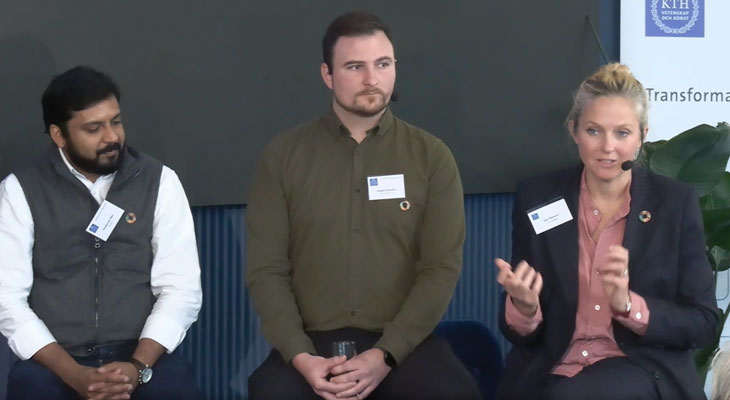
Angelo Demeter, Co-Founder and Chief Product Officer at Volta Greentech , talked about their efforts to reduce methane emissions from cattle by adding seaweed to their feed, which deactivates methane-forming bacteria. LOME, low-methane minced beef, can already be found in stores.
Next-generation food products with fungi as the protein base are being developed by food tech company Mycorena . Ramkumar Nair, Founder & CEO, explained that the company is focusing on technological progress to develop the industry’s products and production methods, and not just on developing the new protein.
“One benefit of our fungi-based protein product is that it has no taste, unlike soy beans for example. You can even make ice cream from our product,” Nair explained.
Sara Maxence, Innovation Manager at ICA Sverige , spoke about how the company is working with food innovation. It is working alongside academia on its strategy, which aims to reduce climate impact by 50 per cent up to 2030.
The panellists then discussed the greatest challenges in scaling up sustainable food production. Several participants highlighted the importance of greater consumer awareness and altered behaviour, for instance through nudging. Also important are the dynamics of the food chain and its ability to adopt new products and methods.
“When it comes to collaborating with the academic world, I’m looking for faster interaction from idea to contact, on everyone’s part. It also has to be easier to find the right person in each research project,” Sara Maxence explained.
Angelo Demeter was looking for more research into the Swedish farming model and more flexible research funding, whereby it is possible to change direction after a brief period if necessary, with more flexible milestones from financiers.
Before lunch, Johan Gottberg presented the One Planet Plate concept, whereby each meal served does not exceed 0.5 kg of carbon dioxide equivalents. Attendees then enjoyed a vegetarian meal from Fågelängens Catering based on this very method.
Session 3: Academic approaches and contribution to the transformation, part one
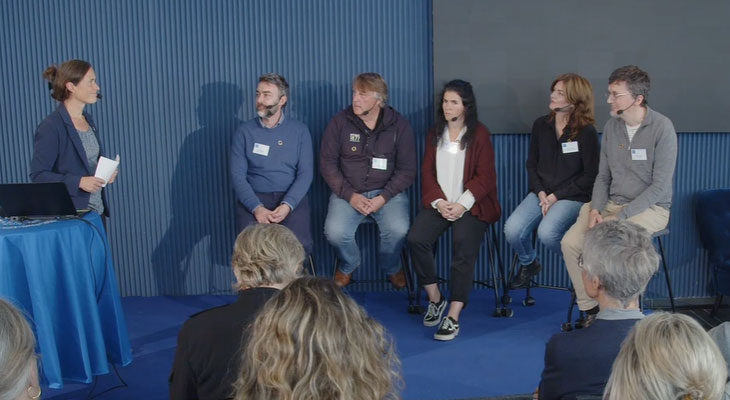
The KTH researchers began this session by talking about their research in the area of food. Marine biologist Fredrik Gröndahl, SEED, ABE, described the new centre called Blue Food , financed by Formas. The aim is to increase Sweden’s self-sufficiency and efficiency in food protein from the sea. A large number of academic institutions and partners are involved in the project, including chefs.
Karin Larsdotter is Deputy Director of KTH Climate Action Centre , which aims to increase the impact and accelerate the processes surrounding the 13th global Sustainable Development Goal, DG Climate Action.
Biotechnology researcher Amparo Jimenez Quero, CBH, works among other things with algae. She spoke about the Horizon Europe project CIRCALGAE , which aims to find ways to harness the waste arising from algae production. There are already 12 demonstrator products, including a shampoo. Twenty-two partners in 12 countries are taking part.
In his research, Michael Martin, IVL/SEED , ABE, focuses on the entire food chain, and helps the bodies involved understand whether they’re making the right moves in their sustainability work.
Björn Hedin , ITM, explained his research into ways of using data from the production and consumption of food to help organisations and individuals make more sustainable decisions.
When asked what research needs to make progress, several panel members replied that a higher content of social science research is important, particularly to find out how the solutions might work in practice. There was a general request to work with end users and other stakeholders, to get closer to implementation and understand the needs.
“At Blue Food we have tried to meet people a lot and talk to them about how they would actually use what we develop, which is very valuable,” said Fredrik Gröndahl.
Session 4: Academic approaches and contribution to the transformation, part two
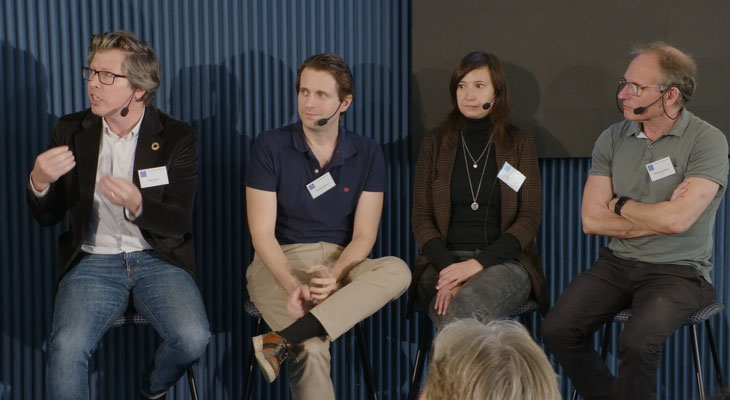
Paul Hudson , CBH and SciLifeLab/KTH, talked about the possibility of producing food with genetic engineering and the latest research on this, such as increasing growth by ten per cent – something he said the world needs as there is a shortage of food.
Stefania Giacomello , SciLifeLab/KTH, also talked about how data-led research into genes and an understanding of how living cells react to the external environment can be a contributor to knowledge about tailored diets, for example.
Ricardo Vinuesa, SCI, presented the results of his study into whether AI makes a positive or negative contribution to the SDGs , which has been published in Nature Communications magazine.
Mikael Hedenqvist , CBH, spoke about food and polymers. His research has included ways of using gluten as a polymer and how this could contribute to increased sustainability in the food system.
The following discussion focused on challenges faced by research in the field of food. One aspect was the difficulty in convincing companies to have the courage to transition to new methods. One challenge with the application of AI is that it has to be trained based on real data, which requires feedback from producers and consumers alike. Paul Hudson highlighted the advantages of using microorganisms for food production:
“They are not country-dependent, but can be produced in bioreactors that can be located anywhere, such as Luleå [in northern Sweden]. Even with electricity prices as high as they are now, these organisms can be produced energy efficiently. Another benefit is that if we accept GMO, we can tailor the properties of the foods. We can make our own palm oil in Sweden and avoid importing 10 kilos of palm oil per person per year from Indonesia.”
Several participants mentioned the importance of communicating more across sectors and disciplines, not just online. Also that the field of food requires a holistic approach. Only then will it be possible to resolve the really big issues.
Before the afternoon break, representatives of Mineralskiftet (wholegrain products that increase mineral absorption), Naima (vegan cakes) and Chitocoat (longer shelf-life for fruit and vegetables) talked about the products being served and how they contribute to better health and sustainability.
Session 5: What’s next? How do we take transformation forward?
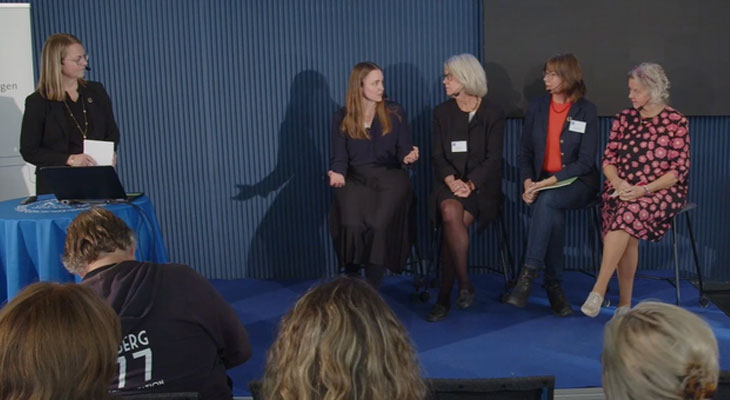
Marie Gidlund is Director of Operations for Sweden Food Arena . She talked about the arena’s work on e.g. business models that manage the risk of innovation, what technology is required, and what consumers really think. The aim is to bring the entire food sector together and find solutions together.
Inger Andersson, Chair of the National Committee for Food Research , talked about the ten-year programme headed up by Formas, which has distributed SEK 530 million to 79 projects since its inception in 2017.
Camilla Eriksson, Researcher Civil Defence & Crisis Preparedness at the Swedish Defence Research Agency , provided a reminder that the food sector is part of Sweden’s total defence. She presented a historical summary of the food preparedness Sweden once had, and how the reconstruction of that is now under way.
Ingela Stenson , Editor-in-Chief, Business Intelligence Analyst, Strategist and Transformer, spoke about trends and how food has become something that defines us as individuals. She also highlighted the opportunities that Sweden has to export food, especially considering Sweden’s strong reputation abroad and its leading position in sustainability.
The panel discussion mentioned the strongly increasing interest in domestic food production in Sweden, but that the preparedness currently lies with the commercial sector. There needs to be a transformation in the food sector so that farmers and other small food businesses, 95 per cent of which have fewer than ten employees, continue to earn money.
Buying Swedish is the best way to bolster the industry, according to one participant. Denmark was highlighted as a role model, where unlike in Sweden the innovation system has been concentrated around food. The authorities in Sweden work in isolation as well, which leads to duplicated effort and a lack of clarity. In research too, more collaboration is needed so that all parties can build further on the knowledge that exists.
“When Statistics Sweden measures innovation, it only measures the companies with more than 10 employees, which means that we build innovation systems that are only suitable for large companies. We at Sweden Food Arena have now measured the degree of innovation in the food sector, and have found that it’s equally high as in all industries. But the level of ambition is too low, it’s about incremental innovation. This is where the transformation becomes exciting, how we can communicate the results of the research so that the smaller companies also gain financially,” explained Marie Gidlund.
The panel conveyed a request to KTH for greater knowledge regarding how it is possible to raise competitiveness and profitability among the companies in the food system, including the smaller ones. Also, how it can be made easier for people to implement a sustainable lifestyle. More interdisciplinary research was another wish.
What’s next at KTH?
Monica Bellgran, Rebecka Milestad and Francisco Vilaplana finished the day by summing up their impressions: the scale of the response (full attendance, with late registrations having to be declined), the fact that the event had brought together so many different disciplines and areas of expertise, and that KTH is now a serious contender in transforming the Swedish food sector, particularly through its KTH FOOD centre.
“The KTH FOOD centre initiative has just begun and builds on the KTH Food Sustainability Network. The centre is a five-year, interdisciplinary initiative that aims to bring together everyone at KTH who’s interested in healthy, sustainable food systems, whether they’re researchers in the field of food or they’re working on industrial transformation, or some other area that’s necessary in achieving a transformation in the food system,” said Rebecka Milestad.
Francisco Vilaplana went on to describe how KTH FOOD is setting about identifying the links between different areas of research, with the private sector and government agencies, but also the students at KTH Campus.
“We want to be the natural gathering-place for everyone who wants to be part of development in the area, and we’re really looking forward to seeing how it all develops!”
The hosts finished by asking the students who had worked on this year’s Transformation Day up onto the stage, and conveyed a big thank you to them for their efforts. The students then presented the student association they represented, KTH Foodtech , and urged the participants to get in touch if they wanted to collaborate.
Text: Håkan Sandberg
A recording from the Transformation day 2022, will soon be available on the KTH Industrial Transformation Platform web page .
KTH puts the food industry in focus for a sustainable transformation

